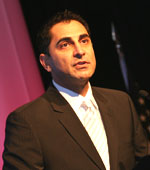|
|||||||||
| Certiport PATHWAYS 2006 World Conference | |||||||||
This conference provides an exceptional opportunity to understand the various challenges we face, define the commonalities and differences among them, create strategies for success, and explore what it means to be an effective global citizen. Along our own global journey over the past nine years, we at Certiport have learned many valuable lessons. With input and collaboration from you and other educators and leaders from around the world, we have sharpened our focus and managed to create more relevant solutions to the issues tangled between education and technology in a fast-evolving global setting. We have learned of the higher transforming power of current and relevant programs, the unifying and aligning properties of global standards for digital literacy and desktop proficiency, and the irreversible impact of a uniform language of digital communication and collaboration. If we can understand the motivation and aspirations of our fellow citizens—be they students or adults, as an individual or a whole community, or even where innumerable communities form a nation—and also understand the outcomes that they seek, individually or collectively, we can devise solutions and pathways for their success. As we listened to the diverse population we serve across 128 countries, we understood timeless truths—that individuals strive to be effective citizens, partaking of social and economic opportunities, having their expertise acknowledged and their skills put to productive use. We learned that communities strive to strengthen their social fabric and effectiveness—through inclusion of diverse elements—and in turn, being included themselves and their voices heard. And we learned that nations large and small are vying to participate on the global stage and to be able to contribute to the social and economic forums influencing the world around them. Effective Citizenship, Inclusion and Participation emerge as the strongest common denominators across all groups—their individual and collective dream. How can we as educators, solution providers and leaders help realize the elements of this dream? Where is the appropriate tool box, what are the specific tools, and how can they help? Where do we start? How do we establish the relative strengths and weaknesses of the components in each community? What are the specific challenges we have to overcome? Consider a similar journey of our predecessors at the dawn of the global age. Early in the 20th century, when commercial air transportation became viable because of advances in aeronautics and design, they were faced with a communications challenge. Pilots crossing over the national airspace of different countries needed to communicate with air traffic control towers along the way to ensure safe passage. They needed a universally adopted common language. Fortunately today, pilots from any nation can perform their functions effectively without having to personally address the challenge of mastering multiple languages. This is all possible because in 1953 English was adopted as the universal standard language for air traffic communications. In 1997, as we at Certiport heeded a call to create global certifications which would carry equal weight from Kansas to Korea, we began to understand the value of the global approach to standards and the opportunity for benchmarking and measuring across a uniform premise. We began to understand and embrace the different states of development and direction that had already taken shape in different geographies, and understood the hardships in the journey to unite, align, and arrive at a globally accepted standard. Our global approach at Certiport required global partnerships with standards bodies, educational authorities, governments and corporations all around the world. We understood that despite the enormous difficulties ahead, the common currency that would emerge from our work would help unite the efforts of many nations seeking similar outcomes—participating in the global village despite their locations and languages. We understood the indispensable value of global standards in a global age. We understood our need to measure progress from an initial state of partial preparation to a final status of a validated accomplishment. This set of standards, measurements and validation would complete our tool set for taking the communities from one side of the divide to the other. Adapted from Aug. 5, 2006 PATHWAYS Awards Gala.
|
|
||||||||

